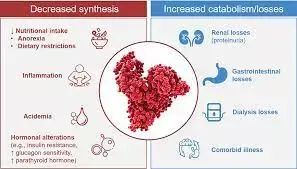- Home
- Medical news & Guidelines
- Anesthesiology
- Cardiology and CTVS
- Critical Care
- Dentistry
- Dermatology
- Diabetes and Endocrinology
- ENT
- Gastroenterology
- Medicine
- Nephrology
- Neurology
- Obstretics-Gynaecology
- Oncology
- Ophthalmology
- Orthopaedics
- Pediatrics-Neonatology
- Psychiatry
- Pulmonology
- Radiology
- Surgery
- Urology
- Laboratory Medicine
- Diet
- Nursing
- Paramedical
- Physiotherapy
- Health news
- Fact Check
- Bone Health Fact Check
- Brain Health Fact Check
- Cancer Related Fact Check
- Child Care Fact Check
- Dental and oral health fact check
- Diabetes and metabolic health fact check
- Diet and Nutrition Fact Check
- Eye and ENT Care Fact Check
- Fitness fact check
- Gut health fact check
- Heart health fact check
- Kidney health fact check
- Medical education fact check
- Men's health fact check
- Respiratory fact check
- Skin and hair care fact check
- Vaccine and Immunization fact check
- Women's health fact check
- AYUSH
- State News
- Andaman and Nicobar Islands
- Andhra Pradesh
- Arunachal Pradesh
- Assam
- Bihar
- Chandigarh
- Chattisgarh
- Dadra and Nagar Haveli
- Daman and Diu
- Delhi
- Goa
- Gujarat
- Haryana
- Himachal Pradesh
- Jammu & Kashmir
- Jharkhand
- Karnataka
- Kerala
- Ladakh
- Lakshadweep
- Madhya Pradesh
- Maharashtra
- Manipur
- Meghalaya
- Mizoram
- Nagaland
- Odisha
- Puducherry
- Punjab
- Rajasthan
- Sikkim
- Tamil Nadu
- Telangana
- Tripura
- Uttar Pradesh
- Uttrakhand
- West Bengal
- Medical Education
- Industry
Higher Albumin levels linked to better prognosis in patients with AKI

Higher Albumin levels linked to better prognosis in patients with AKI suggests a new study published in the BMC nephrology.
While the association between decreased serum albumin (ALB) levels and increased risk of acute kidney injury (AKI) is well established, the risk of death among patients with AKI with low serum ALB levels is unclear. We aimed to evaluate the association between serum ALB levels in patients with AKI and mortality, and help guide their clinical management.
The included patients were those diagnosed with AKI and admitted to Zhejiang Provincial People's Hospital between January 2018 and December 2020. The clinical endpoint was all-cause mortality rate at 90-days and 1-year. Patients were divided into four groups according to the quartiles (Qs) of ALB measurements at admission. Cumulative survival curves were calculated using Kaplan–Meier analysis, and Cox proportional risk models were used to assess the association between serum ALB levels and 90-day and 1-year all-cause mortality.
Results
This study included 740 patients with AKI. Patients with measured ALB values were classified into quartiles: Q1 ≤ 26.0 g/L (n = 188); Q2 = 26.1–30.5 g/L (n = 186); Q3 = 30.6–34.7 g/L (n = 183); Q4 ≥ 34.8 g/L (n = 183). Univariate analysis using Cox regression showed that for every 10 g/L increase in ALB, the 90-day and 1-year mortality decreased by 29%. Among the four subgroups, patients with lower ALB levels had a higher risk of death. After adjusting for demographics, comorbid conditions, inflammatory index, and medicine, the lowest ALB quartile (ALB < 26 g/L) was associated with increased risk of 90-day mortality (hazard ratio [HR], 1.76; 95% confidence interval [CI], 1.30 to 2.38, P < 0.001) and 1-year all-cause mortality (HR, 1.79; 95% CI, 1.33 to 2.41, P < 0.001).
ALB levels in patients with AKI were significantly correlated with prognosis, and the higher the level, the better the prognosis. Compared to patients with ALB ≥ 34.8 g/L, patients with 26.1 g/L < ALB ≤ 30.5 g/L had an increased risk of 90-day and 1-year all-cause mortality of approximately 40%, and patients with ALB ≤ 26.0 g/L had an increased risk of 90-day and 1-year all-cause mortality of approximately 76% and 79%, respectively.
Reference:
Yang, K., Yang, N., Sun, W. et al. The association between albumin and mortality in patients with acute kidney injury: a retrospective observational study. BMC Nephrol 24, 332 (2023). https://doi.org/10.1186/s12882-023-03323-x
Keywords:
Higher, Albumin, levels, linked, better, prognosis, patients, AKI, BMC nephrology, Yang, K., Yang, N., Sun, W.
Dr. Shravani Dali has completed her BDS from Pravara institute of medical sciences, loni. Following which she extensively worked in the healthcare sector for 2+ years. She has been actively involved in writing blogs in field of health and wellness. Currently she is pursuing her Masters of public health-health administration from Tata institute of social sciences. She can be contacted at editorial@medicaldialogues.in.
Dr Kamal Kant Kohli-MBBS, DTCD- a chest specialist with more than 30 years of practice and a flair for writing clinical articles, Dr Kamal Kant Kohli joined Medical Dialogues as a Chief Editor of Medical News. Besides writing articles, as an editor, he proofreads and verifies all the medical content published on Medical Dialogues including those coming from journals, studies,medical conferences,guidelines etc. Email: drkohli@medicaldialogues.in. Contact no. 011-43720751


